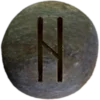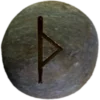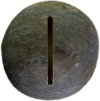Last Updated on December 28, 2024
Table of Contents


Fárbauti (FAR-bow-tee), whose name means “Cruel Striker” or “Dangerous Hitter,” holds a significant place among the jötnar (yoht-nar), the giants of old tales. His name reflects his ferocious nature, often interpreted as a representation of lightning striking trees and igniting fire. Other spellings include Farbauti and Fárbaute. ![]()
Fárbauti is primarily known as the father of Loki, Helblindi (HEL-blin-dee), and Býleistr (BEE-layst-er), linking him to several pivotal figures. In The Prose Edda by Snorri Sturluson, Fárbauti appears as the consort of Laufey (LOUGH-fay) or Nál (NAHL), whose name means “Needle.” Together, they symbolize forces of nature, with Fárbauti’s lightning and Laufey’s foliage creating Loki, a force of chaos and change.
Though Fárbauti himself does not appear prominently in many surviving tales, his role as Loki’s father grants him indirect influence in various narratives. Loki’s actions, both helpful and destructive, often shape events in ways that highlight the unpredictable power inherited from his giant lineage.
Fárbauti’s fiery connotations reflect the raw, untamed energy of natural elements, an essential aspect of old beliefs. Giants like Fárbauti represent primordial forces of chaos, destruction, and transformation. They serve as a counterbalance to the ordered realms of the gods. His legacy lives on through his children and the ripples of their deeds.
Elder Futhark Runes Associated with Fárbauti
The Hagalaz rune (ᚺ), pronounced “HAH-gah-lahz,” reflects Fárbauti’s destructive power. It represents hail, sudden disruption, and the chaotic forces of nature. Like Fárbauti’s lightning, Hagalaz reminds us of nature’s ability to destroy and reshape in equal measure. ![]()
The Thurisaz rune (ᚦ), pronounced “THUR-ee-sahz,” embodies the strength and challenge of the jötnar (yoht-nar), Fárbauti’s kindred. Thurisaz speaks of defense, raw power, and primal energy. These qualities echo the giant’s fiery influence, reminding us that chaos brings transformation. Both runes represent Fárbauti’s energy and the unpredictable forces he embodies.
Importance to Asatruar
Fárbauti holds a vital place for Asatruar as a symbol of transformation through destruction. His connection to fire and lightning highlights nature’s unpredictable yet necessary forces.
As Loki’s father, Fárbauti contributes to some of the most pivotal events. His volatile energy teaches that chaos and destruction balance order and creation. Asatruar reflect on his fiery legacy when seeking inspiration to face challenges and grow through adversity. Fárbauti reminds us that even the fiercest storms leave the ground fertile for renewal.

